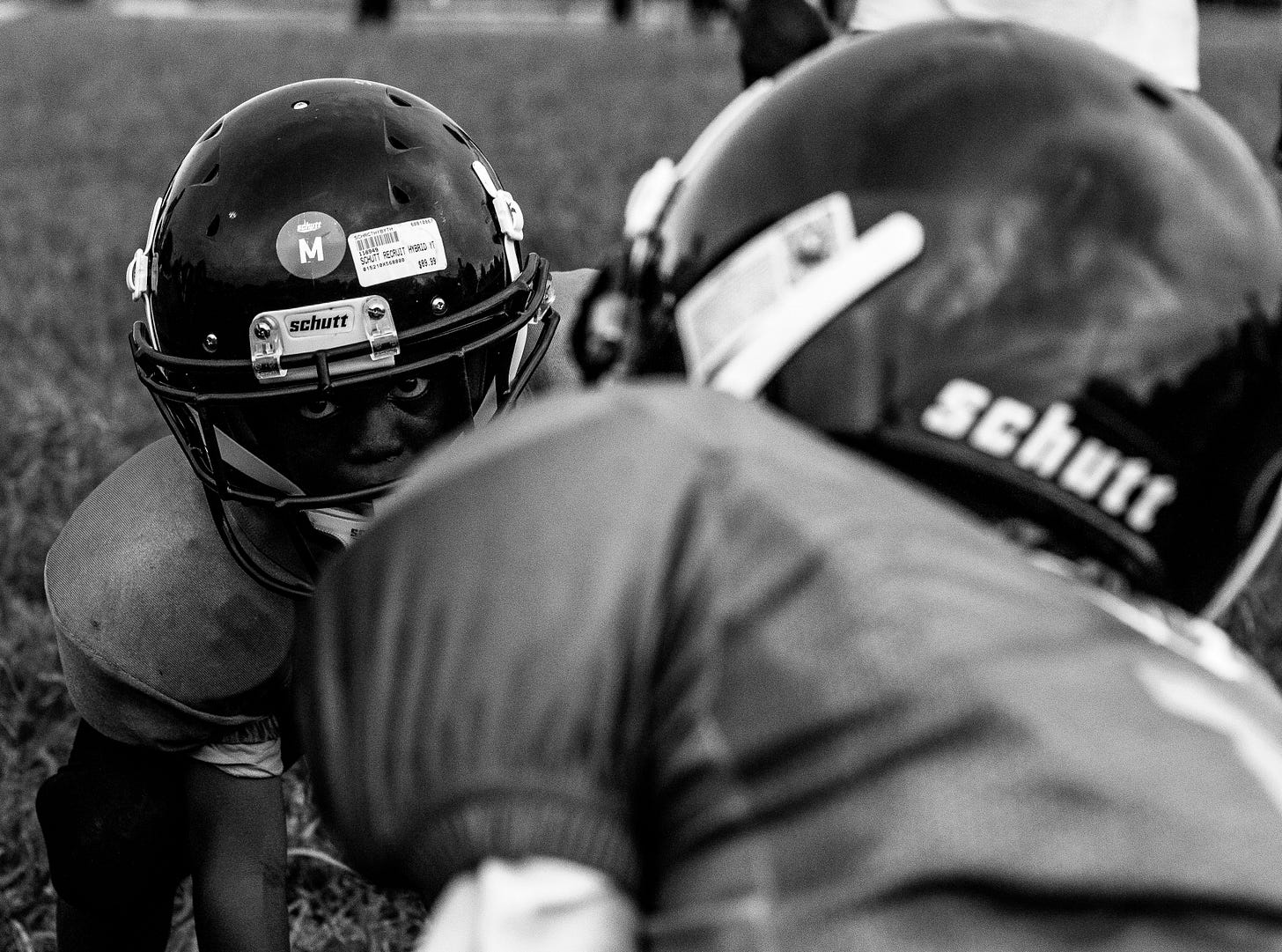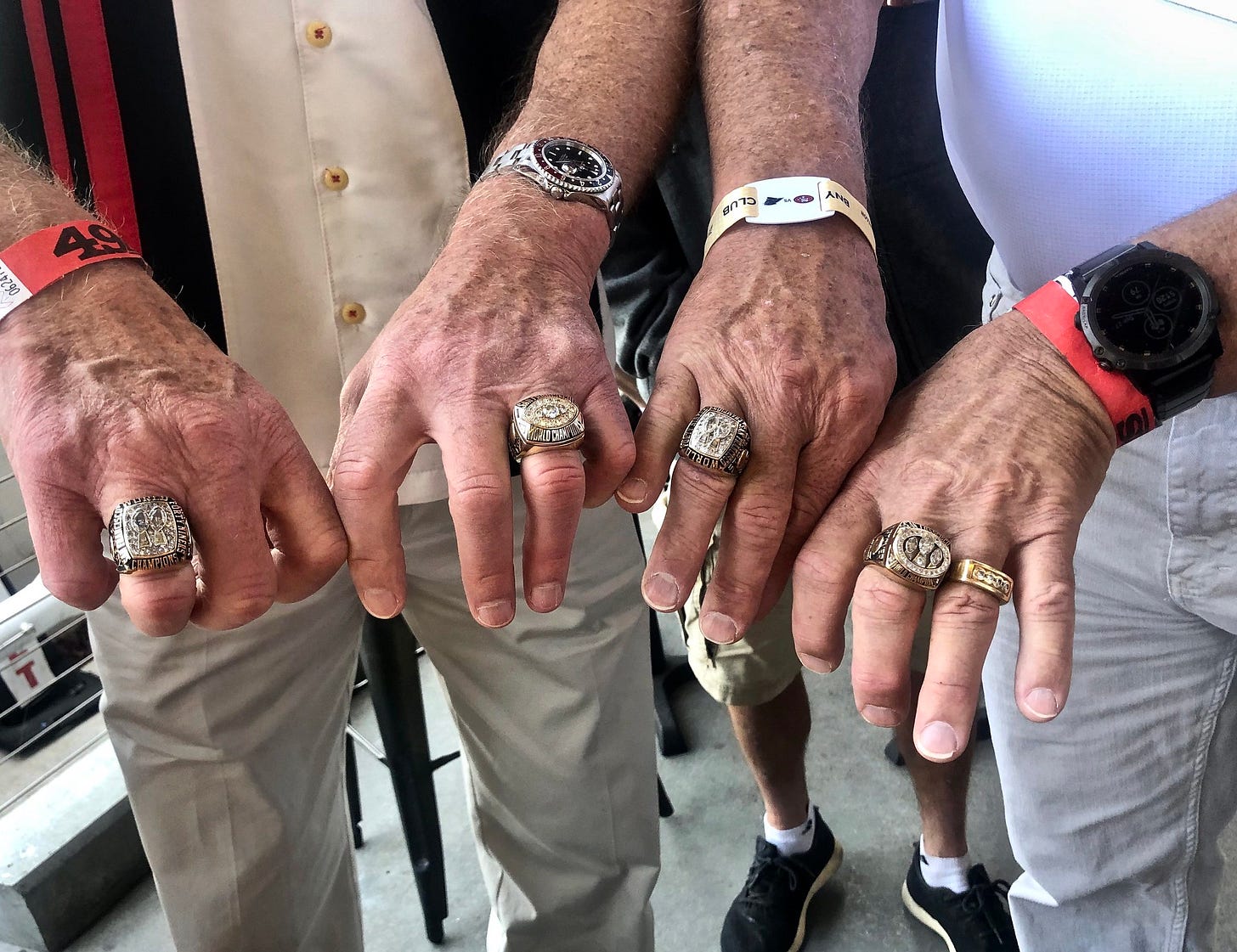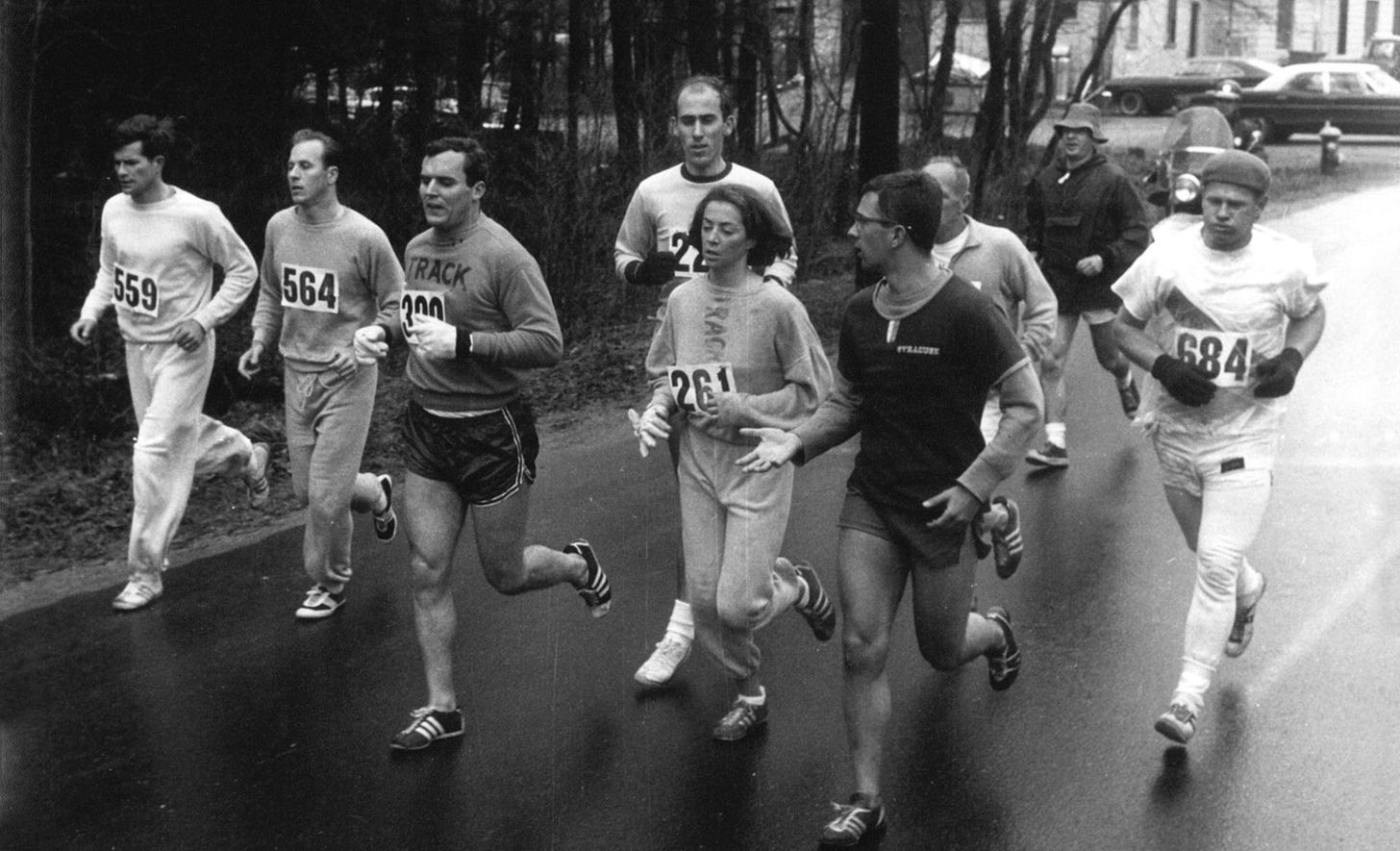America’s soul lives on at the ball game
#20: Gridiron jewellers, misfit punters, timeless time lapses, barrier breaking in Boston, and Donald Trump vs the Super Bowl...

Tales from the fringes of sport and society…
There’s a big reason the world might be feeling down on the USA these days. It’s one that’s loud, rude, and orange.
For the next four years, you might be hard-pressed to read anything positive about our Transatlantic cousins.
But there is hope in its sporting institutions. They’ve proven before that they are robust enough to stem the oncoming tide of bile heading its way. Donald Trump has a history of feuding with the NFL and the NBA. Which suggests they’re on the right side of history.
It’s easy to see why the president is irked by these powerful sporting bodies. They’re members of the world’s wealthiest sports leagues, yet their outlook is uniquely egalitarian. Universal squad salary caps mean no black gold can elevate one team over another. Draft systems see those finishing bottom of the pile get the pick of the best new talent next time around.
Grubby connections and brazen sycophancy offer no help here. Raw talent is the only currency of value. It means that diversity and inclusion aren’t viewed with a roll of the eyes, but with a roll of the dice. Everyone gets a fair shot. Everyone.
American sport has fairness running through it. And fair is a terrifying word to people like Trump. Those who’ve always looked down from the top floor don’t like it when you tell them the guys in the basement can get in the elevator.
US sport divides opinion in Britain, where it's an easy target for a scoff and a sneer. It’s too polished. It’s too commercial. It’s too cheesy. But as football drip feeds its soul to oligarchs, cricket hands out the begging bowl to private equity, and rugby suffers death by a thousand cuts, British sport isn’t really in a place to judge.
Say what you like about the Yanks, but their sports have stayed true to their roots. The bravado. The brashness. The stat-happy broadcasters in power suits. The goddam whoopin’ and a hollerin’. It’s all been there since day one. It’s not their fault others are trying to copy the formula.
The Americanisation of sport might be a global contagion, but patient zero is doing just fine. In a few days, the Super Bowl will stop the country in its tracks. More than 125 million Americans will tune in. Less than a fifth of that watched the Presidential inauguration this month.
Donald Trump will disagree, but the search for America's soul begins at the ball game.
In this month’s newsletter, we’re extending a hand across the pond to bring you fascinating people and brilliant stories that really do make America great. Enjoy the selection.

Gridiron bling: A peculiar history of Super Bowl rings
In Britain, we save our pomp and ceremony for royal occasions. But over the Atlantic, the glitz and the glamour are to be found in elite sport. Their kings and queens aren’t born in palaces. They’re made on turf.
These sporting monarchs don’t wear crowns on their heads. Instead, the treasure is to be found on the fingers of its champions. It’s a tradition that is almost a hundred years old, and it’s created as many off-field capers as on-field legends.
The rings have become part of a national mythos. The American dream cast in gold. For players, they’re not simply fancy mementoes. They’re symbols of sporting history that they helped to forge.
In the latest episode of Unsung, we dive into the history, the allure, the craft, and the intrigue behind the Super Bowl’s championship rings.
“If you go back 50 years, they had rings. But they were very small and understated. Whereas now it's less of a practical piece of jewellery and more of a trophy to celebrate.”
Hit the play button above to listen now, or click here to listen to Unsung on your preferred podcast platform
On the 22nd March, I'll be appearing at the Morpeth Book Festival in Northumberland. I’ll be sharing some previously untold stories relating to my Unsung book and podcast. If you can't make it that far north, send any questions in as it’ll air as an episode of the Unsung podcast later in the year. If you can make it, tickets are only a fiver and it would be great to see you. Click above to read more, or hit the button below to get your ticket. I look forward to seeing some of you there!

They stole Yogi Berra’s World Series rings. Then they did something really crazy.
The Atlantic
“Berra’s rings now glinted on Trotta’s hands. They evoked for him a magnificent time before his own birth: the mid-century years when Berra had won World Series after World Series with teammates such as Joe DiMaggio, Roger Maris, and Mickey Mantle. How many men besides Berra—and now Trotta—would ever know the feeling of those rings on their fingers? How many besides Trotta could sense the weight of all those victories, then destroy every last ounce of it for cash?”
An entire game, distilled into a single image
NFL Films
“Pelle Cass finds beauty in the chaos of football with his timelapse photography.”

Power player: Inside the journey of the NHL’s first female coach
Religion of Sports
“Anytime you have different people in the room, you get different and good outcomes; you get unique outcomes. You get problems solved in a different way. I think that’s how you get ahead in life—and in sport.”

Barrier breaker
Glorious Sport
“Anything can happen in a marathon, and although she’s trained up to 31 miles to leave nothing to chance, nothing can prepare Kathrine Switzer for what’s about to happen, a race that will determine her life path, change the course of women’s sports, and become a milestone in women’s rights history.”

How deliberate miskicks changed one of sport's strangest positions
BBC Sport
“The 6ft 5in Australian tells the story of when he was introduced to a great Green Bay Packers linebacker, who asked him what position he played. "I said 'punter'," says Bennett. "Ach," replied the linebacker, a two-time Super Bowl winner. "You're not even a real football player. And he just walked away," laughs Bennett, who spent most of his NFL career with the San Diego Chargers in the 1990s. "I had no credibility with him at all."
Friday Night Lights: A town, a team, and a dream
H.G. Bissinger
“Instead of understanding that they were the beneficiaries of history, they began to believe that they were the creators of it.”
In 1988, author H.G. Bissinger enjoyed a dream assignment for any sports writer. He spent a season embedded with an American Football team. Football is followed with a religious fervour in the small town of Odessa, Texas. Every Friday night, thousands gather to watch the Permian Panthers, a high school team with a storied past and a community’s hopes resting on their shoulders.
Bissinger’s gripping, deeply reported account details the triumphs and heartbreaks of young athletes under immense pressure. It also explores the racial, economic, and social tensions that shape their world. More than just a sports story, Friday Night Lights is a powerful portrait of the American dream and its cost.
Thanks for reading January’s edition of Off-Field. If you enjoyed it, use the buttons below to like the newsletter, post a comment, or share it with others.
You can get in touch at hello@off-field.net
Read previous editions of Off-Field at offfield.substack.com/archive
Subscribe free for future editions of Off-Field, or share it with a friend:
“America did not invent human rights. In a very real sense, it is the other way round. Human rights invented America” - Jimmy Carter













